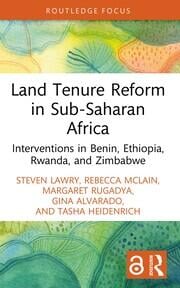The roundtable session on carbon markets and climate justice addressed how carbon trading frameworks can be designed to protect community land rights, especially as countries in Africa and Asia establish legal frameworks in line with Article 6 of the Paris Agreement. The discussions highlighted…
This book examines the impacts of land tenure reform interventions imple-mented in Benin, Ethiopia, Rwanda, and Zimbabwe.Since 2000, many African countries have introduced programs aimed at providing smallholder farmers with low-cost certificates for land held un-der customary tenure. Yet there…
There is a noticeable dearth of empirical studies on the mediating role of travel behaviour on the influence of residential density on traffic congestion in developing countries particularly in Zimbabwe To address this gap this study examined the effect of residential density on traffic…





